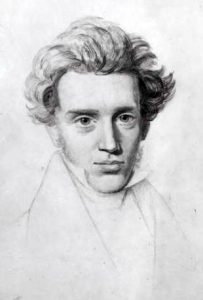
Perhaps the first real existentialist was Søren Kierkegaard who was quite a bit ahead of his time when it came to seeing the kind of mental chaos that made existentialism a better explanation for the bedlam we call human existence than a lot of other philosophies. He said, “Yes… ok… truth is subjective. Everyone has his or her own truth. You all want to believe this because it means you don’t actually have to talk to anyone who disagrees with you. That’s messy and nobody can afford to lose a drinking buddy over something as trivial as how people should treat one another. So have it your way. But…” That’s not really what he said, of course, but it’s close to what he would have said if he lived in the same self-centered universe we live in today. But there is a flip side. If you want your own truth, you are responsible for acting on it. And this doesn’t happen based on a simply evaluation of how you want to act at any given time. It assumes a level of responsibility that we are not used to taking on in the 21st century. Here’s how it works.
Because truth is subjective, and because I do not have a real essence when I first come to the realization that I exist, I am responsible for making something of myself. I become a project that converts my behaviors into a character who behaves in the way my previous actions indicate. I am a self, and I am made up of what I have done up until now. I am responsible for the choices I have made, I am free to make any choices I want in the future, and I will be responsible for those once I have made them. When I look at a truth I subscribe to, one that is personally mine, and for which I accept full responsibility, I need to give serious thought to its place in the world. If I do this honestly, I will almost always find that it corresponds, to one extent or another, to the personal truths of a great many other people. In other words, I begin to see myself, not just as my own project, but as an object in the project of others who are putting themselves through the same self definition I am putting myself through. I can address this one of two ways. I can see myself in the third person – as a project of my own, making my own decisions in the company of others. Or, I can take on the other’s definition of me. If I make my own decisions, become who I am in my own project based on my own choices, and take my place in the project of others seriously, then I am being authentic. If I take on the role assigned to me by the others, then I lapse into boredom, anxiety and despair which are sure signs that I am not acting authentically.
Martin Heidegger took this a step further. He agreed that we are made up of our experiences but he rejected the idea of a subjective or an objective view of the world. We are not distinct from the world. Our experiences make up our place in it. People are not human beings that happen to rattled around in the world. We are “being there.” Our humanity consists of this journey to death and we can either be what “Das Man,” (The They, The One, The Nameless, Faceless Other Guy) tells us we are, or we can be authentic. If we are being authentic, we find ourselves engaged in the world, and we act instinctively toward others as a genuine self. We don’t have to prove it to anyone. We don’t have to say it out loud. We just do it. It’s not easy and it causes us quite a bit of angst, but we keep it up because people acting authentically know that Das Man can’t be trusted to get it right. Angst is the insecurity we feel when we know these engagements are governed by unpredictable rules. Still, we act and, in acting, both define ourselves and find a kind of humility.
